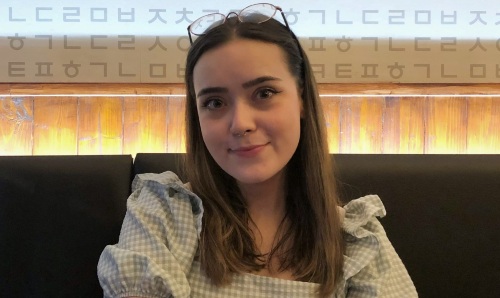Lauren Vango
BSocSc Sociology (2020)
Lauren is a Statistical Officer at Health and Safety Executive. She graduated from Manchester with a First Class BSocSc in Sociology in 2020. Here, she talks about what she does now and how she got there following her time at Manchester.
My current role and how I got there

I work for the Health and Safety Executive as a Statistical Officer, I produce annual national statistics on work-related ill health (such as musculoskeletal disorders and stress, depression and anxiety), individual industries (such as Public Admin and Defence, Education, Human Health), and do comparisons with other countries.
I also support and run surveys and do statistical analyses on these results. The annual statistics we produce directly influence policy and decision-making in order to make workplaces a safer environment for workers and the public.
I went to university not exactly knowing what career I wanted. I had many ideas ranging from social researcher to probation officer, but just chose the subject subsequent modules that interested me most.
I was always quite intimidated by statistics and quantitative approaches in Sociology, but during my second year I studied the mandatory Survey Method in Social Research course when I realised that I enjoyed the quantitative and mathematical side to sociology and it naturally came a lot easier to me, rather than the qualitative side.
The mandatory research method courses were extremely valuable to me and gave me a lot of skills and more confidence within statistics. Learning to use SPSS proved to be one of the most important things I did and helped me get the job I now have. Additionally, some of the modules I took were taught by quantitative sociologists who often brought in statistical techniques into their work which helped to understand complex sociological concepts and their application in the real world, and the statistical analyses, both of which I now do in my work.
Finishing my degree and looking for a job in the midst of the COVID pandemic in 2020 proved very difficult, but I applied for lots of jobs and realised that my skillset and the jobs that I was drawn to were mainly statistics based and I realised that was a viable path to go down. I applied for a statistician job through the Government Statistical Service and from there they allocated me a government agency to work for.
My experience at Manchester
I studied Sociology at A-level and thoroughly enjoyed it and knew I wanted to carry on with it at degree level. Whilst looking into Universities, I noticed that The University of Manchester had such a diverse range of modules that didn’t seem to be matched by any other university. This gave me the freedom to study a variety of things in detail, ranging from Societal Changes in China to Sociology of Fashion to Secrets, Lies and Mass Deception to Sociology of Human-Animal Relations. The modules were all extremely unique.
Additionally, the mandatory modules of research methods and social thought were a great basis for understanding the other modules and mean that new skills and techniques could be learnt and applied later in the course.
The ability to study modules from different schools or subjects within the University under Interdisciplinary Learning (UCIL) was a big attraction of The University of Manchester and it meant that I got to study Beginners Korean as a module in my second year through the Language Experience for All Programme (LEAP) which I was extremely excited to do.
The confidence my degree has given me in myself, and my work was most surprising. I feel confident in my work to put my expertise to good use to voice my opinions. I am the only person in my team at work with a background in Sociology, so I have a unique perspective and my knowledge is very often utilised, particularly with research methodologies and conducting surveys.
As I am also experienced in qualitative research, I can offer support on an ad hoc basis to various teams, so the knowledge I gained from university has given me a variety of skills which make me useful in my job and gives me more confidence in myself and my work.
My advice for future students
You may not find the mandatory courses on research methods and social thoughts as interesting initially as the optional, more applied courses. But these are the courses that set you up and build your knowledge to understand the other modules. Particularly with research methods, these are the skills learnt which will most likely benefit you in the future if you have a career within the social sciences.
In my statistical work for a government agency, research method knowledge, particularly in surveys is well sought after, alongside knowledge in programs like R, SPSS, Python etc. With an increasingly automated world, I would recommend taking modules with these programs if you want to gain the skills certain employers look for.
But if you have no idea of what you’d like to do for a career, just take the modules you find most interesting, try to expand your skill set, take advantage of UCIL and LEAP, and from there you’ll have lots of possible routes to go down
